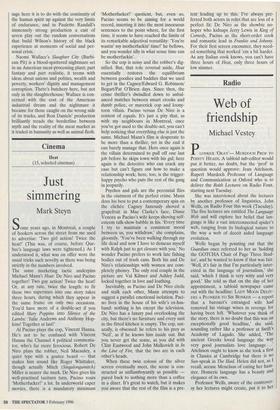Cinema
Heat (15, selected cinemas)
Just simmering
Mark Steyn
Some years ago, in Montreal, a couple of hookers across the street from me used to advertise: 'Two girl action! Twice the heat!' (This was, of course, before Que- bec's language laws were tightened.) As I understood it, what was on offer were the usual tricks such novelty as there was being strictly in the numbers involved.
The same marketing tactic underpins Michael Mann's Heat: De Niro and Pacino together! Two guy action! Twice the heat! Or, at any rate, twice the length: to fit these two superstars into one story takes three hours, during which they appear in the same frame on only two occasions. You'd have more of a double-act if you edited Mary Poppins into Silence of the Lambs: 'Julie Andrews and Anthony Hop- kins! Together at last!'
Al Pacino plays the cop, Vincent Hanna. He's not to be confused with Vincent Hanna the Channel 4 political commenta- tor, who's far more ferocious. Robert De Niro plays the robber, Neil Macauley, a quiet type with a goatee beard — that makes him sound like Roger Whittaker, though actually Mitch (Singalongamitch ) Miller is nearer the mark. De Niro gives his well-practised taciturn turn, Pacino roars `Motherfucker!' a lot. In underworld caper movies, there is a mandatory minimum `Motherfucker!' quotient, but, even so, Pacino seems to be aiming for a world record, inserting it into the most innocuous sentences to the point where, for the first time, it seems to have reached the limits of its remarkable adjectival versatility: 'You're wastin' my motherfuckin' time!' he bellows, and you wonder idly in what sense time can be motherfuckin'.
So the cop is noisy and the robber's dig- nified. But, that role reversal aside, Heat essentially restores the equilibrium between goodies and baddies that we used to get in the Cagney/Edward G. Robinson/ Bogart/Pat O'Brien days. Since then, the crime thriller's dwindled down to unbal- anced matches between smart crooks and dumb police, or maverick cop and loony- toon villain. Pacino versus De Niro is a contest of equals. It's just a pity that, as with my neighbours in Montreal, once you've got used to the double-act, you can't help noticing that everything else is just the same. Michael Mann's film is desperate to be more than a thriller, yet in the end it can barely manage that. Here once again is the villain determined to pull off one last job before he skips town with his gal; here again is the detective who can crack any case but can't figure out how to make a relationship work; here, too, is the trigger- happy psycho who puts the rest of the gang in jeopardy.
Psychos and gals are the perennial flies in the ointment of the perfect crime. Mann does his best to put a contemporary spin on the clichés: Cagney famously shoved a grapefruit in Mae Clarke's face; Diane Venora as Pacino's wife keeps shoving self- esteem talk-show babble in his. 'Every time I try to maintain a consistent mood between us, you withdraw,' she complains, gloomily. 'You've been walking through my life dead and now I have to demean myself with Ralph just to get closure with you.' No wonder Pacino prefers to work late fishing bodies out of trash cans. Both his and De Niro's relationships with women are com- pletely phoney. The only real couple in the picture are Val Kilmer and Ashley Judd, locked together in love and loathing.
Inevitably, as Pacino and De Niro circle and stalk each other, Mann attempts to suggest a parallel emotional isolation. Paci- no lives in the house of his wife's ex-hus- band: nothing is his except the television. De Niro has a luxury pad overlooking the city, but there's no furniture and every unit in the fitted kitchen is empty. The cop, nat- urally, is obsessed: he refers to his prey as `Neil', as if he knows him inside out. But you never get the sense, as you did with Clint Eastwood and John Malkovich in In the Line of Fire, that the two are in each other's heads.
When these twin colossi of the silver screen eventually meet, the scene is con- structed as unflamboyantly as possible pared back to nothing more than a coffee in a diner. It's great to watch, but it makes you aware that the rest of the film is a pre- text leading up to this. I've always pre- ferred both actors in roles that are less of a perfect fit: De Niro as the showbiz no- hoper who kidnaps Jerry Lewis in King of Comedy, Pacino as the short-order cook and romantic lead in Frankie and Johnny. For their first screen encounter, they need- ed something that worked 'em a bit harder. As any Italian cook knows, you can't have three hours of Heat, only three hours of low simmer.


































































 Previous page
Previous page